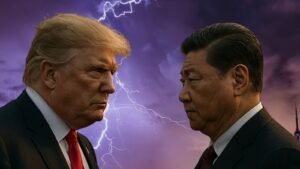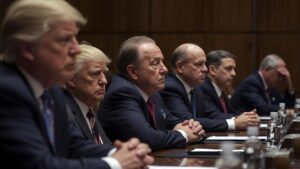At a Turning Point USA event at the University of Mississippi, Vice President JD Vance told students that he hopes his wife, Usha Vance, will become a Christian one day.
He said that the comment was a personal wish based on his own beliefs and that people should be able to choose their faith freely.
The conversation, which was caught on camera during a public question and answer session, quickly spread across social media and got a lot of mixed reactions.
Vance said that his family is raising their kids in the Christian way and that his wife goes to church with them a lot.
He also said that disagreements in a marriage don’t have to be divisive and that faith decisions are a matter of conscience.
The comments brought the couple’s interfaith marriage back into the news and added a new cultural flashpoint to an already tense political year.
Some Hindu community members and interfaith advocates said that a sitting vice president shouldn’t talk about their spouse’s possible conversion.
Some people said that Vance made a wish instead of a demand and that he supported free will. The split response was similar to a larger national debate about where private beliefs end and public office begins.
Vance became a Catholic in 2019 after years of saying he was skeptical of organized religion. He has said many times that his faith journey changed how he sees family and service.
Usha Vance, who grew up in a Hindu family, has said before that she doesn’t want to change religions.
Vance has said in public that the couple’s approach to parenting includes sending their kids to Christian schools and talking about religion at home on a regular basis.
In September, JD Vance said that a shutdown was coming soon and that fiscal brinkmanship was a way to test Washington’s priorities. His comments about Mississippi fit that pattern of mixing identity and belief into politics and policy.
This strategy gets supporters who see religion as a moral compass for public life excited and critics who see religious signalling as exclusionary worried.
In the US and Canada, interfaith marriages are common because people from different backgrounds deal with issues of heritage, ritual, and religious membership every day.
When the subject is conversion, the stakes can seem life or death for people whose faith and tradition are deeply intertwined with their sense of self.
Religious identity can affect how candidates are introduced in communities at home and abroad, as well as how voter coalitions and advocacy networks form.
Indian American and Hindu American groups are paying attention because the discussion is about respect and representation.
Vance’s political risk is that people will read his personal statement about hope as pressure or trying to convert them. The possible benefit is that supporters hear a familiar story about faith and family life.




















